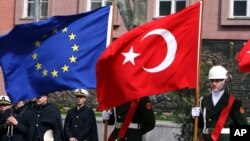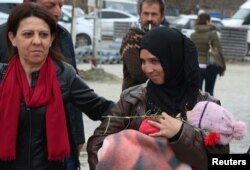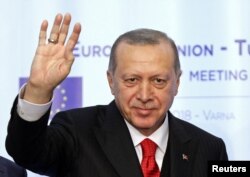Turkey is regressing in several areas, says a European Commission annual report in the group's harshest criticism yet of Ankara's efforts to join the European Union. The report also ruled out any further progress in Turkey's accession in the current situation.
"I am afraid the country continues to make huge strides away from the EU," said European Commissioner for Enlargement Johannes Hahn at a news conference. "The commission repeatedly called on Turkey to reverse this trend as a matter of priority and make very clear recommendation on this in today's report."
The commission issues an annual progress report on all EU applicants from fields covering human rights to the economy. This year's findings are widely considered among the most critical in Ankara's decades-long membership bid, with particular criticism in the areas of justice, public administrative reform, fundamental rights and freedom of expression.
Turkey has been under emergency rule since a 2016 failed coup.
Tens of thousands of people have been arrested in a resulting crackdown, along with hundreds of thousands of others being fired from their jobs. On Thursday, parliament is expected to extend emergency rule for three months, with the government arguing the country still faces a threat by conspirators.
The commission strongly criticized the crackdown, calling for "an end to the state of emergency, without any delay."
The report ruled out any further progress in Ankara's membership bid, saying, "Under the current circumstances, it's unthinkable to open up new [accession] chapters."
To achieve membership, any applicant country has to complete 38 chapters. Ankara has completed only one chapter, with several European countries already blocking further progress.
"These [EU report] words are probably the harshest we've ever seen in the past decades," said political scientist Cengiz Aktar. "Turkey is now, for the EU, a third country, not a membership candidate. It's not a country that negotiates; the progress report talks mainly more about regrets rather than progress."
While Ankara's membership bid remains frozen, the report acknowledged Turkey's economic prowess, describing it as "much advanced" and a "functioning market economy."
Turkey has a customs union with the European Union and its 80 million people are an important market for European companies.
Turkey's hosting of refugees, mainly from the Syrian civil war, was also praised, with the commission describing "outstanding efforts" to provide for the four million refugees in the country. Since Ankara signed an agreement with the European Union, Turkey is acting as a gatekeeper to stem the flow of refugees into Europe.
Despite the critical report, relations are predicted to continue. "Turkey is a key, strategic neighbor and we will continue our cooperation," said EU enlargement commissioner Hahn. "The relationship with the EU will continue as now through ad hoc deals," said Aktar.
"Economically, Turkey is important to the European Union, the energy connection, the lucrative contracts, tenders," said political analyst Atilla Yesilada of Global Source Partners. But he said Turkey now poses a dilemma for Europe.
He said in the EU, there are "pragmatists" who don't care about human rights. "They want accession [membership process] to end and start a new partnership purely based on economic deals.
"And obviously," he continued, "there are the liberals who want Turkey to improve and not to have any relationship whatsoever until Turkey improves. But at this point, the EU is not in a united position to make an offer to Turkey and they are going to let things reside and will adopt the path of least resistance, which means not to give anything to Turkey but at the same time not upsetting it."
Turkish President Recep Tayyip Erdogan officially maintains that Turkey is committed to EU membership and is pressing Brussels for further progress in the country's accession aspirations. Experts, however, point out that Ankara has given little indication it is prepared to address Brussels' criticisms over human rights, leaving little expectation of progress and a growing belief Ankara's bid is all but dead.
But a rupture in Turkey-EU relations is unlikely even as Turkey faces increasing isolation from its traditional Western allies and ongoing turmoil in Syria.
"Turkish foreign policy is in a bit of trouble right now; it's almost exclusively concentrated on Syria and the future of Syria," said international relations expert Soli Ozel of Istanbul's Kadir Has University.
He said Ankara probably "will want to reduce the tensions with Europe because "Syria takes up all the energy; it involves relations with Russia, relations with Iran, relations with the United States."







